“The feeling is magical. You’re free, it is relaxing" - Sheffield astronaut Helen Sharman 30 on from her voyage into space
and live on Freeview channel 276
In May 1991, she launched on a Russian Soyuz spacecraft and spent 8 days orbiting the Earth, living and working on the Mir Space Station.
Science was key to that mission and it is the importance of the subject she wants children to embrace by learning about it.
Advertisement
Hide AdAdvertisement
Hide AdHelen, who is 58 this month, is convinced up to 80% of the jobs of the future will be in STEM – science, technology, engineering and maths. “So if you have studied those subjects, you’ll be really well placed to take up these opportunities,” she says.
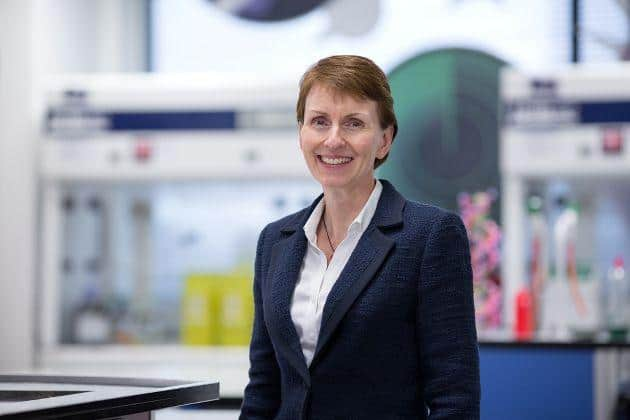

As an OBE and CMG - Companion of the Order of St Michael and St George for services to science - she knows the subject brings reward.
"We don’t know what the opportunities are yet but that’s a nice thing because it keeps your options open and take opportunities that are fantastic,” she says.
"When I was at school in Sheffield I had no idea that I would be an astronaut. There was no space programme in this country, so I didn’t think about being an astronaut as a career. I enjoyed science, did Chemistry, but still didn’t know what I wanted.”
Advertisement
Hide AdAdvertisement
Hide AdShe worked in research but then heard an advert on the radio to join the Russian mission. A British company had been set up to manage the space mission and they advertised for an astronaut.
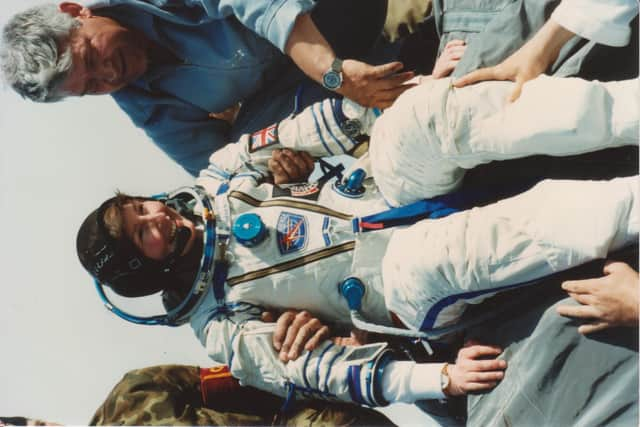

“Because I’d studied a STEM subject, I knew I could apply for it.” Helen was one of more than 13,000 applicants. Two people were chosen for training and Helen’s first task was to learn Russian, as all the training was conducted in the Russian language.
Psychological and medical assessments, technical understanding and practical skill tests were followed by 18 months of intensive flight training in Star City near Moscow. After all this, only Helen was chosen to go to space.
“I can’t believe its 30 years ago,” she says. “It could be yesterday. It was a huge thing in my life, something I’ll never forget and remember fondly.
Advertisement
Hide AdAdvertisement
Hide Ad"I still meet other astronauts, people I trained with, it keeps it current and some of what I do now is talking about Space.”
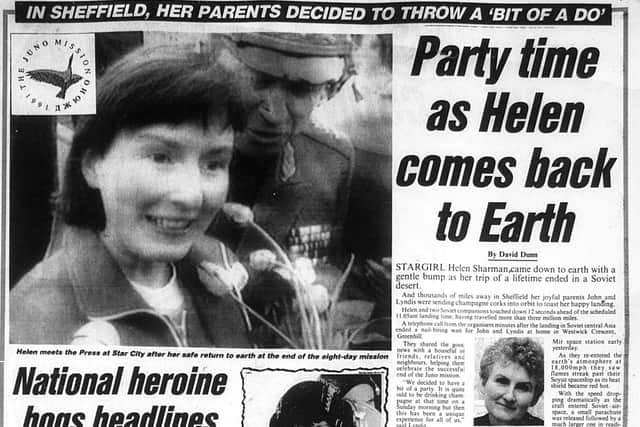

She has three favourite memories. The first is being weightless. “The feeling is magical. You’re free, it is relaxing, you forget what it is like to sit down or stand up because you don’t need to.”
Helen also fondly remembers the experiments, because Space allows you to do things which aren’t possible on earth. This includes growing crystals which are better formed and can be used on Earth for research into diseases such as Alzheimer’s. Science again.
And of course, there’s plenty to look at when you’re up there. “Those views out of the window were mesmorising,” she says.
Advertisement
Hide AdAdvertisement
Hide AdAll thanks to the choices she made in Sheffield. So how does she think of the city now?
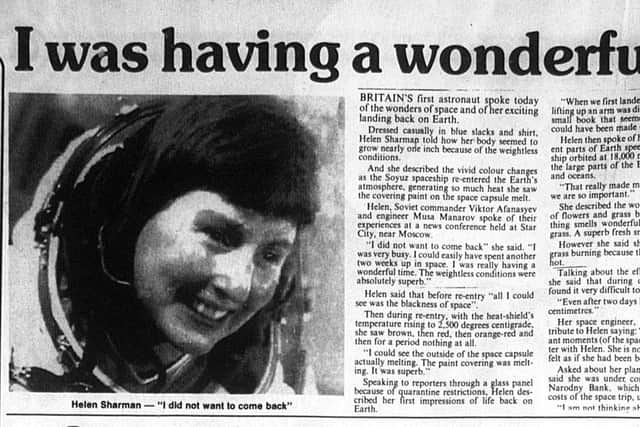

"It’s my home city and I feel very proud to come from Sheffield. I’m touched that Sheffield is so supportive and people are so kind and nice to me.”
She was born in the old Jessop Hospital and spent her first eight years living in Grenoside.
Her family – she is one of three children to John and Lyndis Sharman, with a brother Richard and sister Andrea – then moved across the city to Westwick Crescent, Greenhill. These are the years she remembers best, loving her trips into town.
Advertisement
Hide AdAdvertisement
Hide AdHelen laughs as she recalls trips to legendary toy shop Redgates. “Going into the city centre with friends, going window shopping, our hard-earned cash would be spent in the shops!
"Sometimes dad would drive us into town, it would be a family outing, we’d park the car and have a big day out. Redgates was where we went to spend our Christmas money, you could browse for hours.”
Helen also remembers the Hole in the Road. “The underpass had a great big fish tank, we would always head there.”
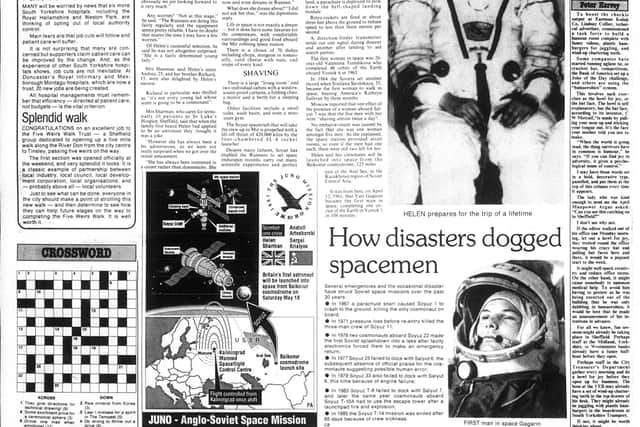

She went to Sheffield University to study Chemistry before eventually leaving the city aged 21. She still has family here. “I come back periodically. I was working in Sheffield when the tram was being built. I remember the disruption, but I’ve used it and they are whizzy and nice.”
Advertisement
Hide AdAdvertisement
Hide AdAnd like a proud Sheffielder, she is sad to see the demise of so many city centre shops. "The sad thing is the city centre in terms of shopping, it’s not what it used to be because of Meadowhall. We always went to the city centre for anything you wanted to buy which you couldn’t get at a local shop.
"And the buses when you went there were really cheap. 2p for a child, 10p for an adult. We frequently used them, it was a great service.”
As an adult her experience was not so good. When Helen spoke at her old school, what was Jordanthorpe Comprehenive and is now Meadowhead School, she told staff she would get a bus back. They warned her the service was not what she remembered and after 45 minutes waiting at a stop, Helen gave up and got a cab.
But these are minor glitches for what Helen describes as a “vibrant city, lots going on, big teaching hospitals, two universities which really keep the place vibrant because new people are coming in and many stay because they like it so much.
Advertisement
Hide AdAdvertisement
Hide Ad"Industry is also important. I know some businesses have struggled in the pandemic, but it wouldn’t surprise me if Sheffield reacted really positively.”
The city has honored her many times. She was given the freedom of the city, buildings are named after her, she has a star on the Walk of Fame and The Star presents the Helen Sharman Award for science in our annual Women Of Sheffield awards. “I don’t have a favourite, it is lovely that they are from places I have connections with.”
She has also written an autobiography Seize The Moment and in the forward Arthur C Clarke wrote: “Her account of the hours before the launch and the actual sensations during ascent into orbit is so gripping that any reader will feel a vicarious involvement. This is exactly what it must be like”.
In 2015, Britain’s second astronaut Major Tim Peake began his mission to the International Space Station. Helen joined Professor Brian Cox and Dara Ó’Briain on BBC’s Stargazing Live to follow the live docking of the Soyuz rocket with the ISS. She was invited back in 2016 for Tim’s safe return to Earth.
Advertisement
Hide AdAdvertisement
Hide AdShe is the UK’s go-to person for comment on the first Lunar Landings and her experiences have led her to being invited to speak worldwide at corporate, public, government, academic and school events.
Her presentation can include a wide variety of topics including Living in Space, training to be an astronaut, teamwork, leadership, communication and motivation.
Helen is keen to press home a message. “We should push forward, not only our individual boundaries, but also the boundaries of what humans believe is possible. People are the biggest limitations in our own lives.
“There's a huge amount we can do and we should make the best use of our lives for the benefit of the world.”
Advertisement
Hide AdAdvertisement
Hide AdHer last engagement before lockdown was in March 2020 was at Sheffield Cathedral, talking to school children. “A lovely event, beautifully organised.”
She draws comparisons between lockdown and being in Space. “The isolation is not exactly the same because we hadn’t prepared for Covid and I had chosen to go into Space.
"But in terms of what we miss in Space such as family and friends, the feeling of being remote.”
The Space Agency recognised this and gave the astronauts time to connect with friends and family. “When I was in Space we only had the radio. Nowadays they use email and satellite phones. It keeps your mental health in good shape.
Advertisement
Hide AdAdvertisement
Hide Ad"In Space it also easy to feel you are without control. Covid was the same because the Government took away things we chose to do, such as where to go and when. When you are told you can’t do that anymore if makes us feel like we can’t control our lives. So you relish the control you do have.”
Helen hopes the lessons she learned in Space will apply post lockdown. “Once you’ve got the basics of survival such as food and shelter, what do you need next?
"I didn’t miss anything to do with physical and material items, like flash cars or the latest phone, that’s not really important. I hope people realise what is important is people – your family, friends and relationships.
"If you can remember that and keep your connections, support your friends and family, the world will be a better place.”
Advertisement
Hide AdAdvertisement
Hide AdWhen asked about her personal connections, Helen goes back to her control reference.
"I don’t talk about my private life, it is one of the ways I have of being in control. It keeps me sane.”
She will say that she hopes to visit the city post Lockdown and continue to work with the universities and Cathedral when it is safe to do. “It’s lovely to rekindle the memories. I’m proud to be from Sheffield and maintain that connection.”